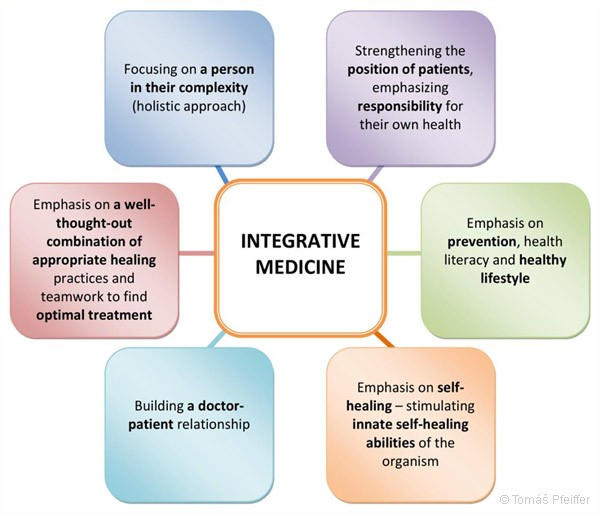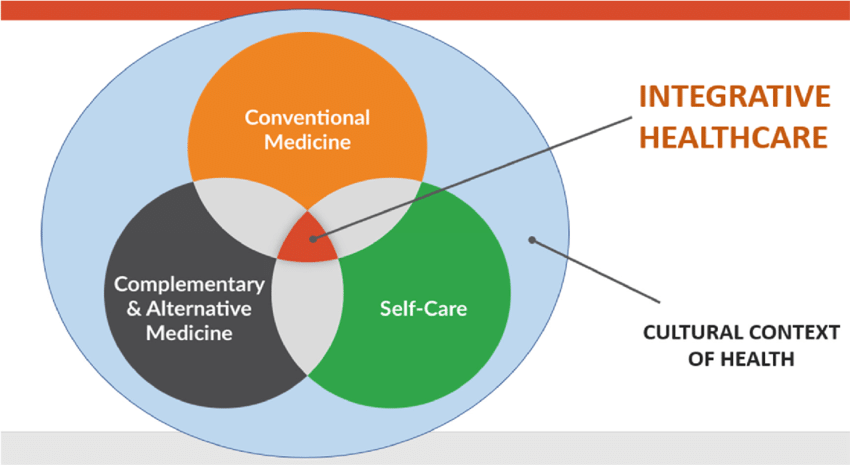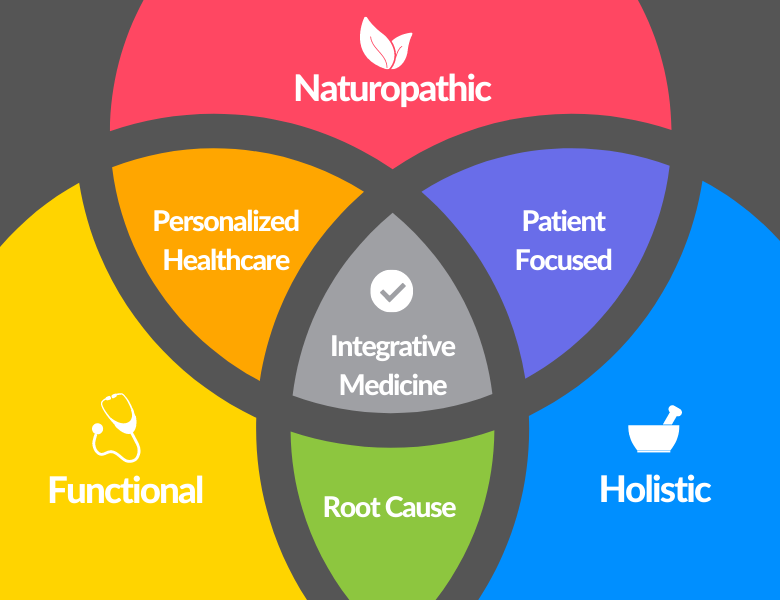
Innovative medicine is changing health care as it combines the best parts of conventional health care with proven complementary treatments that are evidence-based. This approach is focused on the body, mind, and spirit as a whole person by being proactive in the prevention of health concerns and active management. It values the participation of patients and employs a variety of therapies for better health optimization.
Let’s explore integrative medicine in its profundity, showing how it can boost your journey to wellness, help you to manage chronic illnesses, and enhance the quality of life by an individualized approach towards wellness. Come with us on this journey that can change lives; Integrative Medicine.
What is Integrative Medicine?
Integrative medicine is a healing-oriented practice that considers the whole person (body, mind, and spirit), including all aspects of lifestyle, it emphasizes therapeutic relationships and utilizes all appropriate therapies whether they are considered to be conventional or alternative. The goal is not only treating diseases but also attaining and maintaining optimum health.
Fundamental Concepts and Techniques of Integrative Medicine
Key Principles of Integrative Medicine
Patient-Centered Care: The core principle behind integrative medicine is that all patients should receive personalized care based on their needs accordingly this approach practices patients as partners in the treatment decision-making process.
Evidence-Informed Therapies: Although integrative medicine may include alternate therapies, alternate therapies must undergo rigorous safety testing together with efficacy determination. This means best available scientific evidence should be combined with clinical expertise plus patient values.
Health Promotion and Disease Prevention Focus: Preventive measures have been favored in such a way that health would come instead of just waiting for illness to knock in within the integrative healthcare system. Healthy lifestyle practices, such as nutrition and stress management, among others, are being maintained in order to gain health.
Key Components of Integrative Medicine
Standard Medical Methods: This can include drugs, surgery and other western techniques. They are “standard” when used alone or in tandem with other treatments as part of a complete plan for well-being.
Complementary Approaches to Health: This term encompasses an array of practices that typically fall outside what is considered conventional medicine. Examples include herbal medicine, yoga, acupuncture, naturopathy and chiropractic care among others.
Interventions Based on Lifestyle Choices: An important area within integrative medicine involves making changes in lifestyle choices, nutritional counseling, fitness plans, and stress reduction strategies all form part of this approach to treatment.

Healing Benefits of Integrative Medicine
Integrative medicine has a lot to offer in terms of physical, mental, and preventive health. By combining conventional medical practices with complementary therapies patients often achieve more holistic health improvements.
Improvements in Physical Health
Chronic Disease Management:
Integrative medicine has a bright future in managing chronic diseases like diabetes and hypertension. Patients can control their condition more effectively through combination therapy involving drugs and lifestyle changes. For example, diet alteration coupled with stress management may have significant impacts on blood sugar levels (BSLs) and blood pressure (BP).
Pain Management:
The problem with traditional pain management is that it relies heavily on medication which could lead to drug dependency or side effects. However, additional methods are available within an integrated framework such as massage therapy, yoga exercises, or acupuncture all aimed at lowering pain levels while improving quality of life. Scientific research has shown that among other illnesses chronic backache and arthritis respond quite well to treatment using acupuncture needles.
Improvements to Mental Health:
Methods of Relieving Stress:
Holistic medicine suggests that people should employ alternative methods like mindfulness meditation in order to control stress and anxiety. Continuous practice may also cut down on the frequency and intensity of diseases caused by stressful conditions.
Anxiety and Depression Treatment:
Alongside counseling sessions and drugs, there can be a more comprehensive approach toward mental wellness through complementary therapies such as herbal remedies, physical exercises, or nutritional changes.
Preventive Healthcare:
Recommendations About Dieting:
You will frequently find that integrative practitioners are very enthusiastic about nutrition when it comes to being healthy. Tailor-made dietary plans not only avert deficiencies in nutrients but also promote general healthiness while keeping sickness away.
Physical Fitness plus Activity Schemes:
Programs for working out are typically personalized so as to address unique health requirements thereby fostering long-term advantages for well-being.
Routine Checkups Plus Evaluations:
By placing an emphasis on prevention , this aspect of integrative medicine helps in identifying potential problems with one’s health before they become severe.

Exploring the Historical Roots of Integrative Medicine
Integrative medicine is derived from the ancient healing arts. Ayurveda and Traditional Chinese Medicine formed the two bases upon which it evolved with the integration of holistic practices with modern medical science. Natural remedies, herbs, and spiritual practices formed the practice that early civilizations advocated for the promotion of health and wellness. To this date, integrative medicine has transformed into a holistic treatment that incorporates mind, body, and spirit. It uses the best of both worlds employ evidence-based methods with alternative therapies to treat patients holistically.
Research Insights: Findings on Integrative Medicine’s Benefits
Promising is the development of integrative medicine through scientific research. The studies reflect a larger number of improved patients when treated conventionally and in conjunction with alternative treatments. This combination has worked well with patients requiring pain management and anxiety illness.
The studies show that the traditional methods can be complemented by acupuncture, yoga, and herbal practices, which provide alternatives non-invasive in nature for patients. Nevertheless, more large, controlled studies are needed to come to any benefits of a longer duration. The growing interest in evidence-based integrative approaches will increasingly make it a mainstream health choice over time.
Debunking Myths and Misconceptions About Integrative Medicine
Indeed, many misconceptions have been associated with integrative medicine. For example, some people claim that it is not science-based medicine, whereas in fact many integrative practices have research behind them. Another misconception is that it could really substitute conventional treatments; instead, integrative medicine should complement conventional treatments.
Some people believe that integrative medicine is not regulated; however, many practitioners gain certification and formal training. Such an approach also holds the fallacy of only natural treatments being trusted; herbal medication may also be hazardous when applied improperly. Only through education can it reach the heart of that claim.
Finding a Qualified Integrative Medicine Practitioner
The selection of the best integrative medicine practitioner requires researching. First, check if they are certified by a respectable institution. Check on the years the doctor has practiced conventional and alternative treatment. A good practitioner, though holistic in approach, should respect evidence. Look for reviews or ask for recommendations and feel comfortable discussing your health goals with them. This way, you get tailored and balanced care from a practitioner with your values.

Risks and Precautions of Integrative Medicine
Like all medical treatments, integrative medicine comes with some inherent risk. Herbal remedies can interact with prescribed medication in ways that cause the opposite effect of the desired effect. Poorly performed acupuncture or chiropractic adjustments can be dangerous. Let all of your providers know what therapies you are receiving. Only see certified practitioners, which reduces the risk. Taking care and being open with your healthcare team will lead to a safe balanced approach towards integrative medicine.
Practicing Integrative Medicine: Healing at Home Basics
Integrative medicine can be brought to home by the creation of a healing environment. Starting with simple habits such as meditation, yoga, or aromatherapy is a good starting point. Bringing in herbal remedies, proper nutrition, and stress-reduction techniques maximizes your overall well-being.
For instance, design of a serene, clutter-free space also encourages relaxation and mindfulness. The basis is quite simple-an approach to health that incorporates both emotional and mental needs in addition to physical wellness. Along with this, proper self-care practices maintain balance at home. Keeping abreast of the safety measures that are recommended in integrative practices can help you safely apply them at home. Seeking advice from professionals can also further buttress your efforts to heal at home.
Transform Your Life: Personal Growth through Integrative Medicine
The incorporation of personal growth occurs in integrative medicine through the mind, body, and spirit. It trains a person to become an active and effective agent in maintaining their health by establishing lifestyle changes such as mindfulness, exercise, and diet improvement. Emotional and physical transformation can be achieved through embracing therapies like acupuncture, massage, and meditation. Integrative medicine helps create self-awareness and balances emotions to acquire mental clarity and coping skills.
It gradually becomes established over time as based on learning and developing a healthier appreciation for higher wellness, strength, relaxation, and all-around better well-being in life. Integrative medicine can change your life through thoughtful sustainable changes.
The Challenges and Controversies of Integrative Medicine Today
While integrative medicine has very many positive points, controversy and criticism still fill the air. Critics have argued that some alternative therapies do not gain enough scientific proof. Other critics have also expressed concerns over the regulation of the practices of integrative medicine where by some treatments are administered without due oversight.
Patients may also be at risk of abandoning conventional medicine for unproven techniques. Evidence-based practices should be balanced with holistic approaches. People argue that integrative medicine should be used to complement, not replace, traditional treatments and more research is being undertaken to establish it within healthcare.
Cost: Investment in Treatment Interventions
The cost of integrative care differs depending on the treatment and health care practitioner. Most of them are not part of an insurance plan, and many people pay out-of-pocket. A Functional Nurse Specialist may receive education beyond that of a general nurse, which would drive the price up significantly.
Patients often feel that this investment will last for a long time. While integrative medicine is relatively pricey, the gains often justify the cost. You may be able to save money by concentrating your efforts first on treatments that actually help your health and seeking out practitioners who can provide flexible payment plans or sliding scale fees.
Becoming a Practitioner: Your Route to Integrative Medicine
An individual, in order to become an integrative medicine practitioner, requires training from conventional as well as alternative healthcare sources. Train in the mainstream healthcare professions and complement it by gaining certification in complementary therapies such as acupuncture, herbalism, or massage therapy.
Professional associations and practicing workshops to learn the practice of integrative approaches may also be added in one’s skills. After all, apart from training, there must be a holistic and all-inclusive approach in terms of physical, mental, as well as emotional health in the case of the patient. A certification in integrative medicine practice lets you share your holistic health approach with patients in order to achieve the highest quality of living and empowers you to impact successfully.
Connecting Others: Community Building in Integrative Medicine
Building a community in integrative medicine can be a very rewarding and empowering endeavor. Connecting with other people interested in healthy living allows you to share knowledge and work together as you heal. This connection will find you by joining wellness groups within your community, online forums, or social media communities where you learn from other practitioners and like-minded people.
Engage more with the integrative practices through getting involved in community activities, such as wellness retreats and workshops. A supportive network does not just encourage you but also keeps your journey to good personal health and well-being going and motivated.
Wrapping Up!

Integrative medicine is a promising approach toward better health through prevention, individualized care, and use of multiple treatments which have been proven to work through research. It treats all factors that constitute our well-being while considering us as the whole rather than parts alone; the form ensures an all-round approach toward wellness that no other can even achieve.
